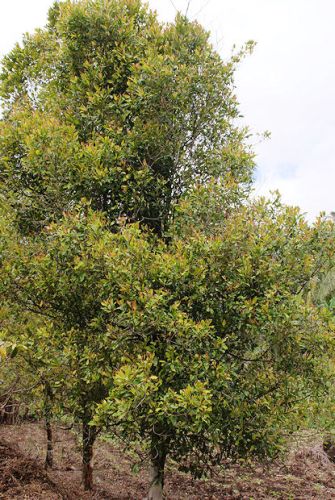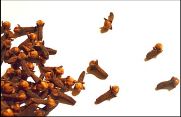- Bad breath- Chew 1 or 2 cloves.[4]
- Cracked nipples- Apply ground cloves to nipples to heal.[4]
- Relieve hiccupping- Grind cloves and Persimmon calynx (available in most chinese
herb shops) into powder; take 2 g each time in water, twice a day.[4]
- Relieve hiccupping- a traditional Chinese formula- Combine 2 g cloves, 3 g
persimmon calyx, 3 g ginseng, and 2 g dried giner and boil; divide into 2 doasages
and drink in 1 day. In my experience, this has never failed to produce results.[4]
- Poor appetite and discomfort in the stomach from indigestion and correct excessive
gastric acid- Boil 20 cloves with red tea leves and enough water to cover; drink
it as tea.[4]
- Add Rou gui to heat up formula for Cold.[5]
[1] Barefoot Doctor's Manual- 1977
Prepared by the Revolutionary Health Committee of Hunan Province. Original Chinese
manual- Victor W. Sidel. Originally published by Dr Joseph Quin and the Fogarty
International centre, Bethdesda (1974). Madrona Publishers Seattle Washington
ISBN 0-914842-52-8
[2] A Complete English Dictionary of Medicinal Terms in Chinese Acupuncture and
Herbalism 1981 - Henry Lu Chinese Foundations of Natural Health- The
[3] Medicated Diet of Traditional Chinese Medicine - Chief Editor- Hou Jinglun.
Associate Editors- Zhao Xin, Li Weidong, Liu Jianxin, Geng Chun-e, Li Guohua,
Li Shaohua. Geijing. Science & Technology Press 1994. ISBN 7-5304-1735-5/R.
309.
[4] Chinese System of Food Cures Prevention and Remedies. 1986
Lu,
Henry. Sterling Publishing Co., Inc. New York. USA. Distributed in Australia by
Capricorn Book Co. Pty Ltd. Lane Cove, NSW. ISBN 0-8069-6308-5.
[5] Translation notes from Gary Seiford and Hocu Huhn - NSW College of Natural
Therapies. Sydney Australia.
Images
1.
www.payer.de retrieved
24-Mar-14
2. pixabay.com by
PublicDomainPictures  Syzygium aromaticum, Eugenia
caryophyllus 丁
香 Dīng xiāng
Clove Family: Myrtaceae
Syzygium aromaticum, Eugenia
caryophyllus 丁
香 Dīng xiāng
Clove Family: Myrtaceae
